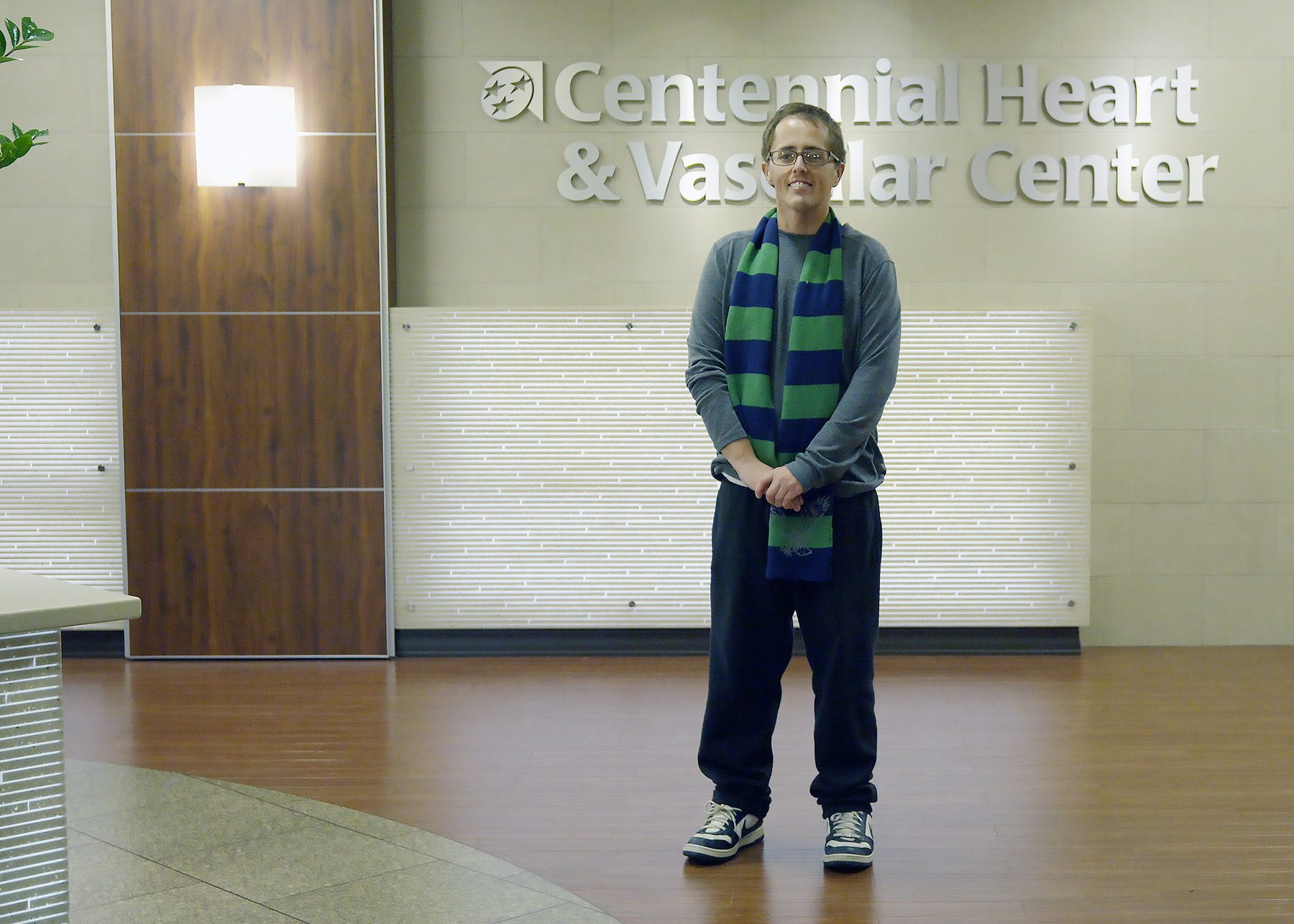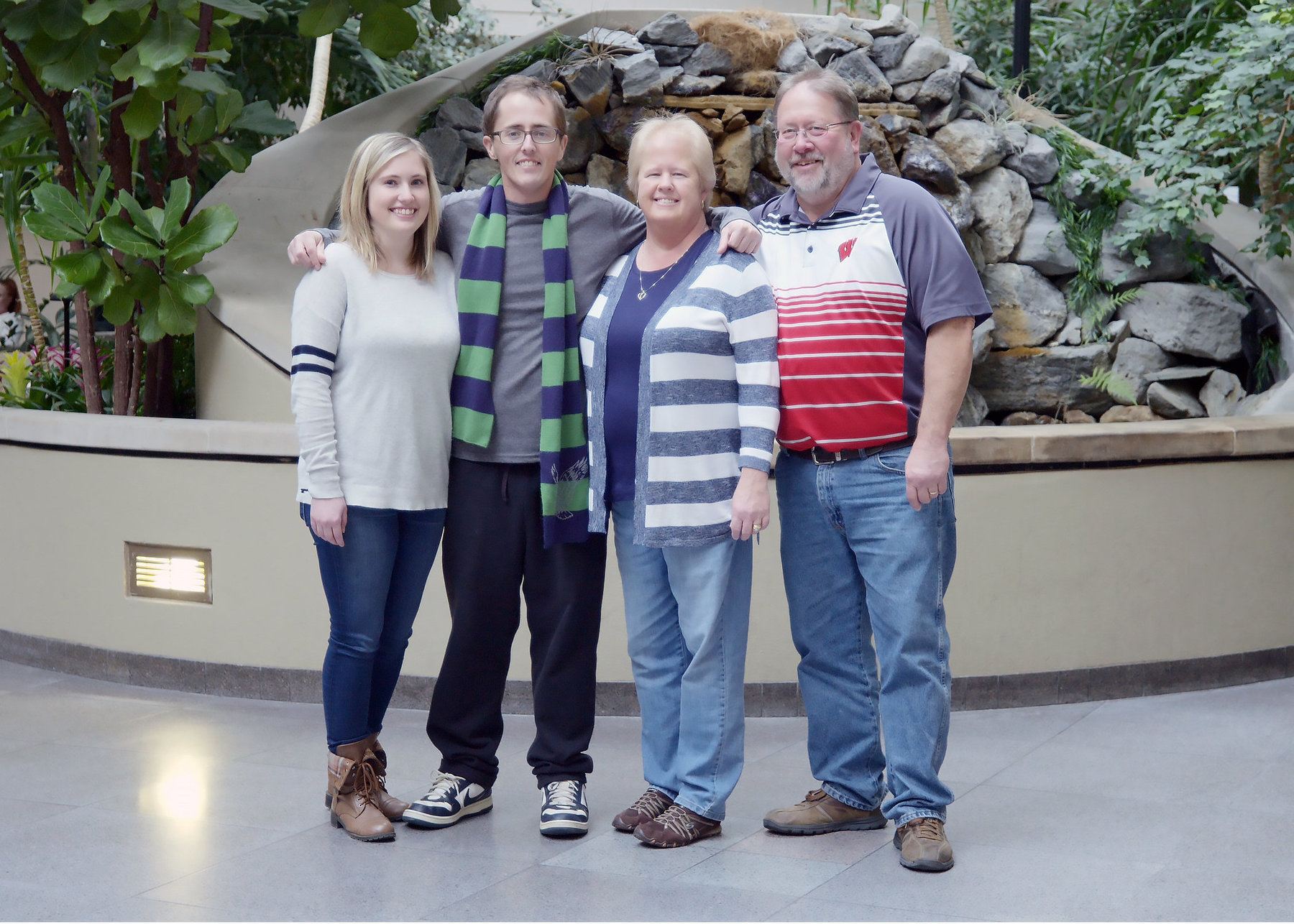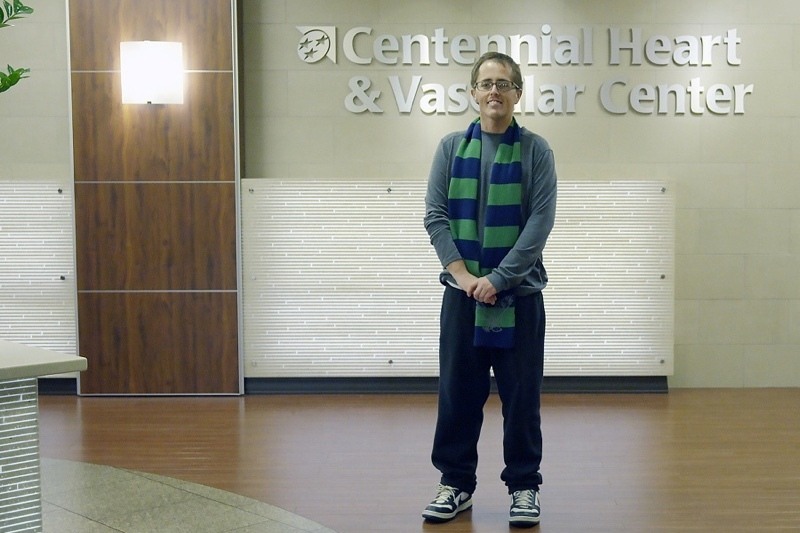On a Thursday in early November, while at work at the Westmoreland Public Works Department, Cody Brummet, 32, began to feel light-headed and had a burning in his chest. The next thing he remembers is waking up on the ground with his co-workers around him. An ambulance took him to the hospital, where a series of tests over the next couple of days proved inconclusive. That Monday, Dr. Paul Kudelko, cardiologist at Tennessee Heart & Vascular, scheduled Cody for a cardiac catheterization, and in the middle of the procedure, Cody suffered a massive heart attack.
“That’s the first time someone saved my life,” says Cody, explaining that doctors revived him and placed a stent in his main artery. “But Dr. Kudelko said I was still in pretty bad shape. I was bleeding, and I’d already bled a lot internally.”
So, Cody was transferred to TriStar Centennial Medical Center, where the rest of his miraculous story unfolds. Our newest FACE of TriStar, Cody Brummet, speaks candidly about his “death experience,” his faith and the doctors and nurses who helped save his life.

What happened when you were transferred to TriStar Centennial Medical Center?
From what I understand, I was immediately put on life support when I got there. I’m not certain about the timeframe, but I had to be revived three times in all — the first time with CPR, and the following two times, they shocked me with the paddles. So they put me on life support, a ventilator and an ECMO [extracorporeal membrane oxygenation] machine, which makes sure your blood is circulating throughout your body. I was bleeding internally [due to a hole in the external iliac artery, which provides the main blood supply to the leg], and they couldn’t get the bleeding to stop. They said I was losing blood as fast as they could give it to me. It was the third surgeon who tried [vascular surgeon Dr. Bryan Fisher] that actually stopped the bleeding. So, I was on ECMO for almost a week in total, and my heart started beating on its own when they took me off the ECMO. But when they tried to take me off the ventilator, my lungs didn’t respond like my heart did, so they had to put me back on the ventilator. Eventually, I was able to come off the ventilator, and the second time I came off the ventilator is when I start remembering things.

What do you remember?
I have a firm recollection of the day I was made aware of why I was there and what had happened to me. I was shocked, and I was grateful, and I was scared. I had an unbelievable nursing staff. I went from being literally flat on my back for two weeks in and out of medically induced coma to walking a couple of days later. Come to find out they weren’t sure whether I would have brain damage, and they weren’t sure that I was going to have use of my lower extremities because they had to leave me on the ECMO for longer than is recommended. They had to do it to save my life, but they thought it might do some damage to my legs. But given all that, I really started to recover quickly. I met all my doctors, who had been by my side with me the whole time doing everything they could. I finally got to have a conversation with them and really start to learn what I’d been through. A lot of it is mind blowing.

What can you say about your doctors and the team that helped you in the hospital?
They played the biggest role humanly possible. I would not trade the experience as a whole at TriStar Centennial. It really reinstilled my faith in people in that position. Before it was the doctors at TriStar Centennial, it was the nursing staff. Because the whole time I can remember being aware, my immediate family was there, and then a nurse or two. They were angels. The extent that they go to make sure that you’re comfortable, the things they have to do, the gritty parts of being a nurse, especially and ICU nurse. They physically carried me around that room because I wanted to try to get up and go to the bathroom. Plus, the stories I hear of the things that they did for me while I was in an out of sedation to make sure I would be a little more comfortable when I finally woke up. The length they go to do their jobs well is unreal. Every single time that I’ve had an appointment in Dr. McRae’s office, I’ve gone to the ICU wing to see if I could see some of those nurses that took care of me. I just want to give them the opportunity to see the impact and the results of their work and dedication.
Talk more about your faith and how it helped you through this experience.
I truly believe that my faith is not what helped me through this; it’s what got me through. And when I say my faith, I’m not necessarily saying my personal faith because it’s like I told my family, I couldn’t pray to my God. I couldn’t ask for healing or the miracle that I received, but it was my faith as a whole, my church’s faith and my family’s faith. They were the ones that lifted me up through all this, and so it’s a little bit more than it being what helped me get through it. I believe it’s the reason I’m talking to you on the phone right now. Even people who were involved medically couldn’t help but contribute a lot of this to just miraculous events because they were so unsure, and things looked so grim for a large part of that first week or so. Dr. [Andrew] Goodman, one of the doctors on the team, told me, “We did everything we could, but at times we didn’t know if that was going to be enough.”

It sounds like your family was by your side every step of the way.
I have such a big family that they had to move them to different places in TriStar Centennial, so they could have a waiting room big enough. My mom has a lot of sisters and a brother, and I have my mom, dad and a sister. Within just a few hours of me being in TriStar Centennial, there were 31 people from my family down there.
Are you thinking about your future or just taking it one day at a time?
I am expecting and anticipating that this next year gives me that glimpse into my future. I know I have a story to tell, obviously that’s why I’m talking to you right now. I know there are a lot of people that will benefit from hearing what I’ve been through and will gain some hope in their circumstances. I think it’s more so the people like my family in the situation that I was in, more than a person like me because like I said, if it hadn’t been for my family’s faith and my family’s willingness to hope … it’s those people who really need to hear what I have to say, and it’s those people that I want to tell not to give up. I’m not looking ahead, thinking, what’s my future going to hold, but I am taking action and making this commitment in preparation for that being revealed to me. A year from now, I’ll have a totally different story to tell. It will be interesting to see what I have to say this time next year. I think I’ll speak from a different part of myself. Right now, I’m talking a lot out of my brain and out of my mouth, but I expect to be talking more from my heart. That’s the point of all this. That’s why I’m doing what I’m doing right now, but who knows? I’m excited to find out.
Thank you to Cody Brummet for sharing your brave and inspiring story, and we wish you all the best in your road to recovery. To learn more about TriStar Centennial Medical Center, visit tristarcentennial.com.
FACES of TriStar is sponsored by TriStar Health. Photography by Grannis Photography.



















